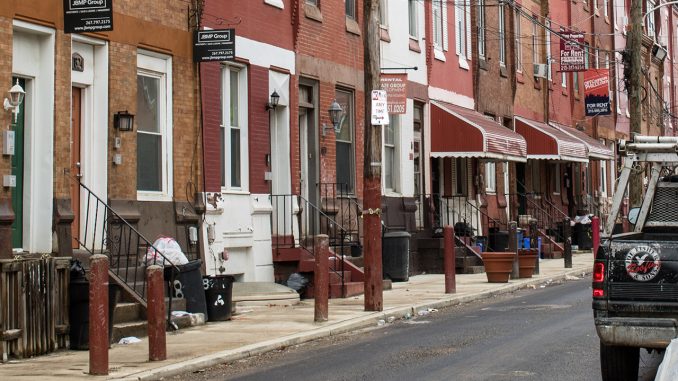
Some North Philadelphia residents, especially elderly people and people with disabilities, are in need of home repairs to increase their homes’ longevity and accessibility.
Sharde Bindes, who lives on 16th Street near Montgomery Avenue, has seen the challenges people with disabilities and seniors face when neighbors do not make repairs and homes become inaccessible to them, something the Philadelphia Redevelopment Authority hopes to offset with a program that offers low-interest loans to both low- and middle-income residents for home repairs.
“I know there are a lot of elderly people who have problems getting in and out of their homes,” said Bindes, whose grandmother was recently diagnosed with stage 4 cancer and was not able to walk up or down the stairs of her home.
“It would be more accessible for them if they want to visit their loved ones because a lot of people can’t walk up so many steps,” she added.
Nearly 75 percent of low- to middle-income homeowners who applied for home improvement loans in the Philadelphia area between 2015 and 2017 were denied, according to a report by the Federal Reserve Bank of Philadelphia. This surpasses both Wilmington, Delaware, and Camden, New Jersey’s, home repair loan denial rates by more than 15 points.
The redevelopment authority introduced the Restore, Repair, Renew program in March, partnering with three nonprofits, Clarifi, the Philadelphia Council for Community Advancement and the Public Health Management Corporation. It is also partnering with two lenders to assist eligible residents obtain 10-year loans of up to about $25,000, which are available to residents with a higher income threshold than other city programs.
“There’s a whole body of research out there about how quality homes affect the stability of blocks in neighborhoods,” said Gregory Heller, the executive director of the redevelopment authority. “There’s the potential that you get enough homeowners within a concentrated area, you could start to have an impact on blocks and neighborhoods.”
The time it takes for residents to receive loans depends on homeowners’ eligibility, Heller said. Those who apply are required to have credit scores above 580 and homeowner’s insurance, and be up to date on taxes and public utilities or enrolled in a payment plan with the city. The program’s lenders will offer eligible homeowners 10-year loans ranging from $2,500 to $24,999 at a 3 percent fixed interest rate.
Like other areas of the city, North Philadelphia has a substantial amount of low- to middle-income homeowners, including people with disabilities and seniors, who could use the program to improve their quality of life, Heller added.
Adrienne Patterson, 56, who has owned her home on Gratz Street near Berks for 19 years, needs to add railings to her stairway and bathroom to make it easier for her to move around without risking falling, she said. Patterson has physical distress, making it difficult for her to complete daily tasks in her home, she said.
The Restore, Repair, Renew program could provide the funds Patterson needs to alter her bathtub to make it more accessible.
“The problem would be that most of [my neighbors and I] don’t have home savings for repairs,” she said. “…whether we just don’t think about it or wait until it happens”
She has yet to apply for the program and said a lack of funding and knowledge of the program are the main reasons she hasn’t taken steps to enroll.
“I don’t know what direction to go,” she added.
Restore, Repair, Renew is a vital part of the city’s goal to “support equitable growth and inclusive neighborhoods,” said City Council President Darrell Clarke, who represents the 5th District, which encompasses Main Campus, in a press release.
“People’s ability to maintain their homes and age in place helps keep neighborhoods stable and primed for investment,” Clarke said in the release.
Ieasha Howard, who lives on 15th Street near Diamond, said that she has seen senior citizens deal with safety concerns.
“The steps sometimes [are] cracked, like the pavements,” Howard said. “They’re not really suitable for senior citizens when they walk with their canes, because they walk and then they trip.”
Many people in her neighborhood, especially senior citizens, lack the funding to make these repairs, she added.
For nearly three decades, PRA’s nonprofit sister agency, the Philadelphia Housing Development Corporation, administered the Basic Systems Repair Program the which provides low-income homeowners with grants to meet “essential repair needs,” Heller said.
Many residents were not eligible for the program because they were above the income threshold, Heller said, which is more than $60,000 higher than Restore, Repair, Renew’s threshold for a four-person household. The Basic Systems Repair Program also has less flexibility about what residents can use the funds for because it’s a grant, not a loan, said PRA’s Public Information Officer Jamila Davis.
“These middle neighborhoods are really important to invest in because they could improve and they could decline,” Heller said. “The decisions we make today and how we invest in them will determine the fate and the outcome of these neighborhoods in the future.”


Be the first to comment